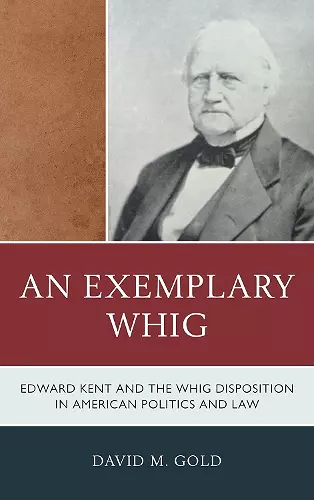An Exemplary Whig
Edward Kent and the Whig Disposition in American Politics and Law
Format:Hardback
Publisher:Lexington Books
Published:6th Jul '12
Currently unavailable, and unfortunately no date known when it will be back

Historians have paid surprisingly little attention to state-level political leaders and judges. Edward Kent (1802–77) was both. He served three terms as a state legislator, two as mayor of Bangor, two as governor, and two as a judge of the state supreme court. He represented Maine in the negotiations that resolved the long-running northeastern border dispute between the United States and Great Britain and served for four years as the American consul in Rio de Janeiro. The foremost Whig in Maine state politics and later a Republican judge, Kent articulated classic Whig political views and carried them forward into his Whig-Republican jurisprudence. In examining Kent's career as Maine's quintessential Whig, An Exemplary Whig reveals his characteristically conservative Whig outlook, including an aversion toward disorder and a deep respect for law, for existing institutions, and for the wisdom of experience. Kent brought his conservative disposition into the Republican Party. He had no use for radical abolitionism, preferring moderation and compromise to measures that endangered social order or the integrity of the Union. Kent saw the "slave power," not abolitionism, as the disrupter of the Union, and he urged the “fusion” of all antislavery elements into a new Republican party. In 1859, Maine's Republican governor appointed Kent to the state supreme court. During his fourteen-year tenure, Kent adopted a Whiggish jurisprudence, pragmatic and commonsensical, and displayed a reverence for the common law and a distrust of “theoretic speculation.” After his retirement, he chaired a constitutional revision commission, admonishing his fellow commissioners to bear in mind the “practical wisdom” that kept dangerous innovation in check. As a politician during the Jacksonian era, Kent exemplified Whig leadership at the local and state levels. In his jurisprudence, he carried the Whig persuasion into the Republican ascendancy and the beginnings of the Gilded Age.
In this engaging biography of Edward Kent, a leading citizen of Bangor, Maine, David Gold reveals the quotidian texture of American public culture in the nineteenth century. Kent’s significance lies in his achievement of a life devoted to what the novelist George Eliot called the 'unmemorable acts' that contribute to 'the growing good of the world.' -- Andrew Cayton, Miami University
The partisan divisions of the Jacksonian era, the rise of the Republican Party in the 1850s, and the nature of the nineteenth-century legal system continue to puzzle American historians. What has long been deemed necessary are state and biographical studies that explore these themes in a local context. David Gold has produced such a work by this well-researched, learned, and intelligent examination of the political and legal career of Whig Edward Kent of Maine. Our field would be well served by more books based on Gold's model. -- Mitchell Snay, Denison University
David Gold has provided an exemplary study of an exemplary Whig, readable, insightful, and unusual in its attention to a lawyer and politician who achieved state rather than national prominence. He makes a notable contribution to our understanding of the 19th-century American Whig temperament. -- Michael Les Benedict, Emeritus, Ohio State University
Through David Gold’s writing Edward Kent emerges from the frontier of nineteenth-century Maine to teach us much about politics, law, and society in a transformative time in American history. -- Daniel D. Blinka, Marquette University
Gold effectively chronicles Governor Kent through adept mining of manuscript collections and, along with Robert J. Cook’s Civil War Senator: William Pitt Fessenden and the Fight to Save the American Republic (2011), illuminates nineteenth-century Maine politics. More work like Gold’s—investigating prototypical New England Democrats such as Levi Woodbury, Isaac Hill, and Isaac Toucey, for example—would greatly enrich our understanding of the antebellum political system. * Journal of American History *
ISBN: 9780739172728
Dimensions: 234mm x 160mm x 23mm
Weight: 567g
272 pages